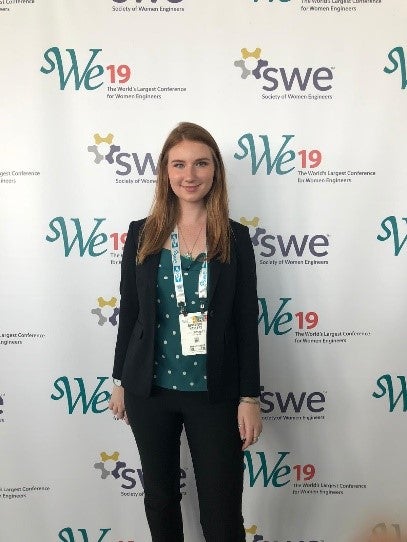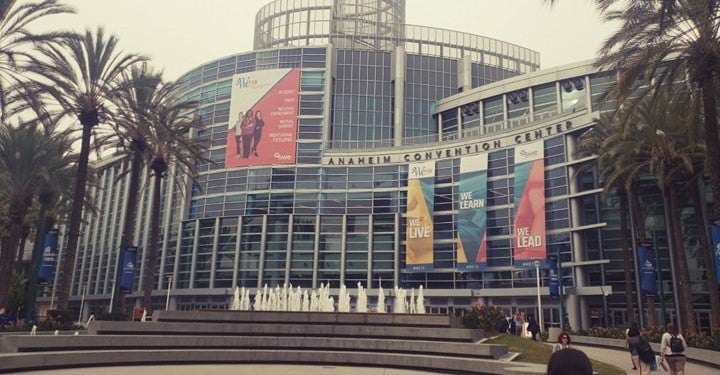The semester is almost over and that means- I am officially halfway to graduation. Crazy right? Lot’s has happened in the past few months. Thank you for tuning in to another blog post by yours truly! Let’s jump in.
Society of Women Engineering Conference
I recently traveled to the Society of Women Engineers conference in Anaheim, CA with my cohort which is the largest networking event in the country. And believe me, it lived up to the hype- I was blown away at just how massive the entire event was. The first night we had an alumni meet and greet which put us in contact with former students who were in our shoes just a few years ago. To be honest, I think I had already made up my mind about the type of work and company I was looking for: something small to mid-size, flexible, environmentally and socially conscious, and innovative. I almost immediately ruled out the large global medtech conglomerates because I assumed they would be too rigid with very refined and cookie-cutter roles. However, after talking to a few of the alumni that night, I learned about the orthopedic departments at some of the larger companies I had previously dismissed. The very next day I went to talk to Medtronic and was offered an interview. After researching more in depth into the company, I realized how wrong my first assessment was. While it’s generally true roles in small start-ups tend to be more fluid and adaptable, there are exciting roles in larger companies that can also benefit from the vast resources made available to only those with a long history, reputation and budget. I was even more excited to hear they have a global corporate citizenship mission that connects training, medical supplies and funding to regions with low access to medical care around the globe.

As many of you know, I have been torn for some time about pursuing either global health, or orthopedics which have appeared to be pretty mutually exclusive. My interviews and conversations with companies at SWE informed me there are select opportunities to merge both of those loves and have a fulfilled personal and professional life without compromising. I am genuinely excited to track down more opportunities like these and see where they take me! As cliché as that may sound, I feel really good about my ability to do both: the innovative spinal cord injury and prosthetic work I want, as well as the volunteering and social philanthropic side that I was previously choosing between. I think at the right company or organization, I can do both.
Pitch Presentation Day!
As I’m sure I’ve mentioned in some of my previous posts, the GMI program has two main projects that we work on throughout the year: our local and global projects. Towards the end of the semester, we have a mock pitch competition where we show our progress both on the design of the solution, and in the formation of a potentially viable company. My team and I began the semester by observing different surgeries at MD Anderson and CHI-St.Luke’s here at the Texas Medical Center. After hours of note taking we transferred all of our insights into ‘mindmaps’ that helped us organize our thoughts and highlight common threads: such as, the need to effectively source and stop bleeds in laparoscopic surgeries. From this single idea- we’ve made an entire company (well, sort of)! I’ll save you the spiel, but our team has been spending the past few months thinking of a simple and innovative way to solve peri-op bleeding. We are designing an image processing software that seamlessly integrates within existing workflow that will identify the bleeding vessels obscured by pooling blood to permit fast intervention by the surgeon.
Fast forward to pitch day and we presented our ideas in front of a panel of school and industry partners who provide great insight and advice. As the last team to present, we had sufficient time to make ourselves nervous despite practicing multiple times. But ultimately, I think we delivered our ideas well!
One of the things I love about this program is how true-to-life it tries to be. In that, I mean the GMI program tries to replicate the realistic process of finding a need, vetting its worth, designing a solution, researching the IP and competition, adding value to what is available and launching your ideas into fruition as innovators do. Throughout the semester we have tackled each stage of a company start-up in a very systematic and intelligent way so that the foundation of the need is strong. From there, we have been working to build a framework around the solution we came up with so we can bring our products to market in a realistic and viable way. Regardless if we pursue this particular solution after graduation, the Healthcare and Innovation Entrepreneurship (HIE) class has been a great training exercise to show us how best to go about bringing our ideas to the real world.
Learn more about our one-year, full-time Master of Bioengineering in Global Medical Innovation.

